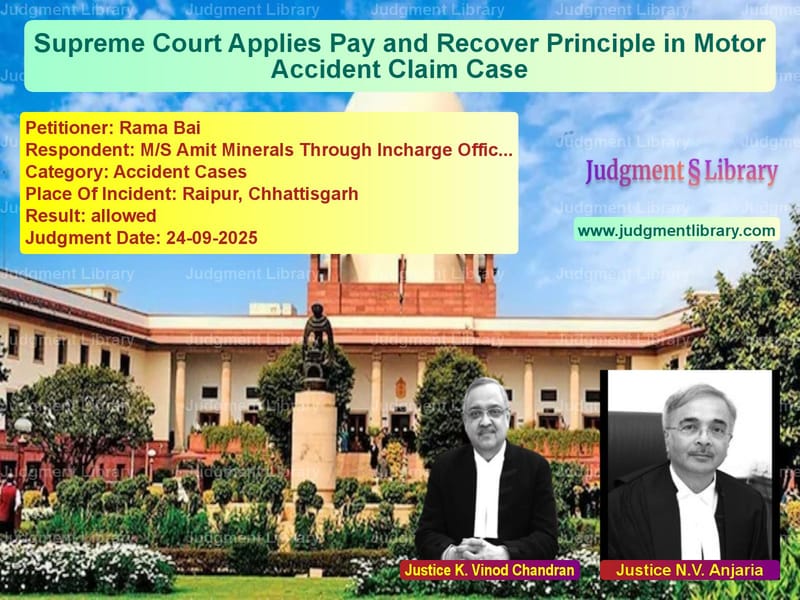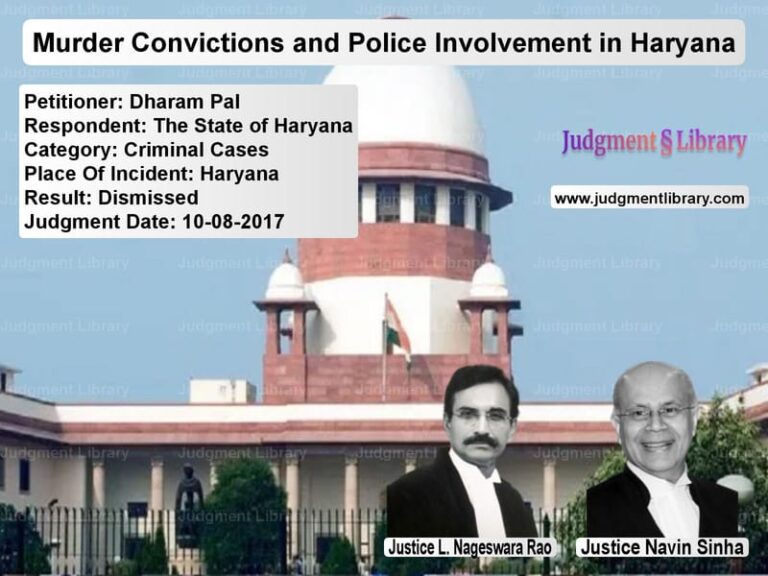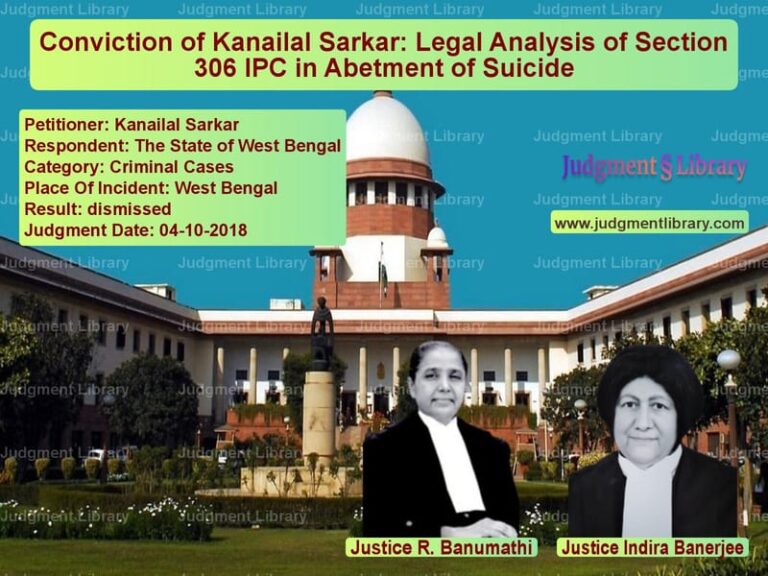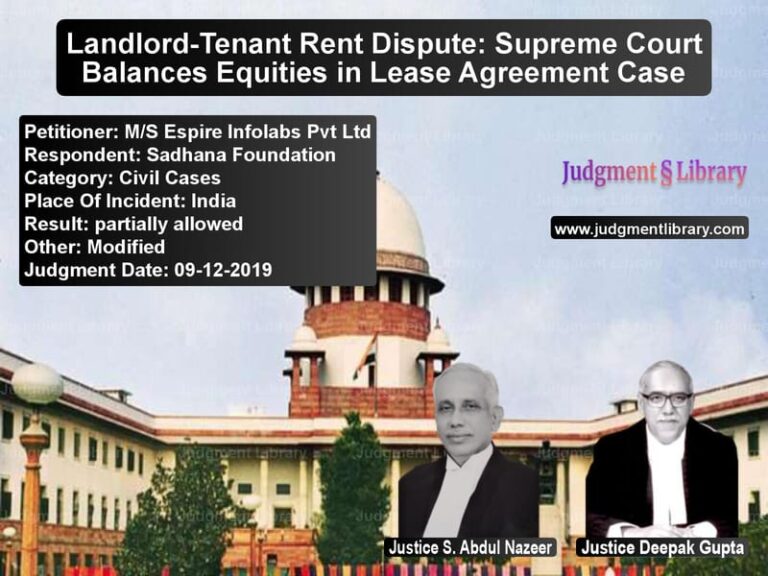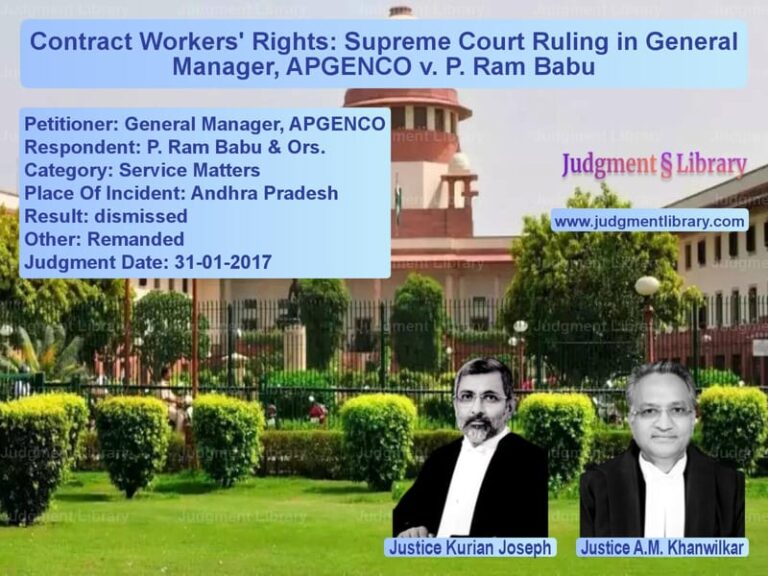Supreme Court Applies Pay and Recover Principle in Motor Accident Claim Case
In a significant judgment that balances the rights of accident victims with insurance company liabilities, the Supreme Court of India recently delivered a verdict that reinforces the ‘pay and recover’ principle in motor accident compensation cases. The case involved a tragic accident that claimed the life of a truck conductor and left his mother fighting for compensation through multiple legal forums. The judgment highlights the ongoing tension between protecting innocent victims of road accidents and enforcing insurance policy conditions, particularly when technical violations like expired driving licenses come into play.
The case originated from a fatal accident that occurred on October 13, 2011, involving a truck bearing registration No. CG-04-J-1233 driven by respondent No. 1, which met with an accident with a tractor-trolley. Nand Kumar, who was working as a conductor in the truck, succumbed to injuries sustained in the accident. His mother, Rama Bai, filed a claim petition seeking compensation for the loss of her son. The case traveled through the Motor Accident Claims Tribunal to the High Court of Chhattisgarh and finally reached the Supreme Court, with the central issue revolving around who should bear the liability for compensation when the driver didn’t possess a valid license at the time of the accident.
The 2nd Additional Motor Accident Claims Tribunal, Raipur, in Claim Case No. 64 of 2012, awarded compensation of ₹3 lakhs to be paid by the driver and owner of the vehicle. The Tribunal found that respondent No. 1, the driver, was not holding a valid license on the date of the accident. This finding was crucial because it formed the basis for the insurance company’s defense against paying the compensation. The specific finding revealed that the driver’s license No. CG.04/2002/0006140, issued from the Regional Transport Office for driving transport vehicles, was not valid from June 20, 2010, to November 2, 2011, as the validity had expired on June 20, 2010, and was only renewed from November 3, 2011, to November 2, 2014. Since the accident occurred on October 13, 2011, the driver clearly didn’t have a valid license on that fateful day.
When the matter reached the High Court of Chhattisgarh at Bilaspur, the court enhanced the compensation from ₹3 lakhs to ₹5,33,600 with interest at 7% per annum from the date of filing the claim application. However, the High Court agreed with the Tribunal’s finding that the insurance company could avoid liability due to the driver not having a valid license. The High Court specifically recorded in Paragraph 16 of its judgment: “In view of aforementioned specific provisions of M.V. Act and authoritative pronouncement of Hon’ble Supreme Court as well as the facts and circumstances of the case at hand where the license of respondent No. 1 was not renewed from 20.06.2010 to 02.11.2011 and the accident took place on 13.10.2011, we do not find any error in the finding recorded by the learned Claims Tribunal that on the date of accident, respondent No.1 was not possessing valid and effective driving license leading to breach of conditions of insurance policy and exonerating the Insurance Company from its liability.”
The appellant, Rama Bai, approached the Supreme Court with a specific grievance. She argued that the High Court should have applied the doctrine of ‘pay and recover,’ which would require the insurance company to satisfy the compensation amount to the claimant first and then allow the insurance company to recover the amount from the driver and owner. This principle ensures that victims don’t suffer due to legal technicalities and delays in compensation. The appellant relied on two important Supreme Court decisions – Shamanna and Another v. Divisional Manager, Oriental Insurance Company Limited and Others [(2018) 9 SCC 650] and Parminder Singh v. New India Assurance Company Limited and Others [(2019) 7 SCC 217].
The Supreme Court bench comprising Justice K. Vinod Chandran and Justice N.V. Anjaria carefully examined the legal position. The Court noted that in Shamanna’s case, which dealt with compensation claims by third-party victims of motor accidents, the Court had reiterated the principle from National Insurance Co. Ltd. v. Swaran Singh and Others [2004] that “the insurer has to pay the compensation amount payable to the third party and the insurance company may recover the same thereafter from the insured.” Similar principles were applied in Parminder Singh’s case where the driver was found driving the vehicle in breach of policy conditions.
The respondent insurance company, however, pointed to a subsequent decision in National Insurance Company Limited v. Parvathneni and Another [2009], where the Court had expressed doubts about the justification of applying the ‘pay and recover’ principle. The insurance company argued that if they were found not liable in law to pay compensation, directing them to ‘pay and recover’ could be beyond legal propriety. The Court acknowledged that there were earlier decisions like National Insurance Co. Ltd. v. Yellamma, Samundra Devi v. Narendra Kaur, Oriental Insurance Co. Ltd. v. Brij Mohan, and New India Insurance Co. v. Darshana Devi where the ‘pay and recover’ principle had been applied, but reservations were expressed in Parvathneni’s case.
However, the Supreme Court noted that in Shamanna’s case, the reference regarding the correctness of the ‘pay and recover’ principle was not finally answered, and the case was disposed of on September 17, 2013, keeping the question of law open to be decided in an appropriate case. This left the legal position somewhat uncertain, requiring the Court to provide clarity in the present case.
The Court recognized that in the present case, the insurance company had a valid defense under Section 149(2)(a)(ii) of the Motor Vehicles Act, as the driver of the offending vehicle was not duly licensed. This would normally allow the insurance company to avoid liability to pay compensation. The High Court had relied on the decision in Ram Babu Tiwari v. United India Insurance Company Limited and Others to find that as per the specific provisions of the Motor Vehicles Act, if the driver doesn’t possess a valid and effective driving license, it results in a breach of insurance policy conditions, exonerating the insurer from liability.
However, the Supreme Court took a pragmatic approach, emphasizing the need to balance legal technicalities with the humanitarian aspect of providing immediate relief to accident victims. The Court stated: “In the above circumstances, going by the series of decisions of this Court, it is only proper that the insurer be directed to satisfy the award, which however can be recovered by the insurer from the insured-owner of the vehicle.”
This decision represents a significant victory for accident victims and reinforces the protective approach that courts have increasingly adopted in motor accident cases. The ‘pay and recover’ principle ensures that victims or their families receive compensation without unnecessary delays, while still preserving the insurance company’s right to recover the amount from the actual wrongdoers – the driver and vehicle owner who violated policy conditions.
Read also: https://judgmentlibrary.com/supreme-court-enhances-compensation-for-100-disabled-accident-victim/
The judgment underscores the Supreme Court’s commitment to ensuring that technical legal defenses don’t defeat the fundamental purpose of compensation laws – to provide relief to victims of accidents. By directing the insurance company to pay first and recover later, the Court has struck a balance between enforcing contractual obligations and serving the larger public interest of protecting innocent victims. This approach is particularly important in a country like India where road accidents are frequent, and victims often come from economically weaker sections who cannot afford lengthy legal battles.
The ruling also serves as a reminder to vehicle owners about their responsibility to ensure that drivers have valid licenses and to insurance companies about their social obligation to accident victims. While insurance companies have legitimate defenses available under the law, the Supreme Court has made it clear that these defenses shouldn’t come at the cost of denying compensation to genuine victims. The ‘pay and recover’ principle thus emerges as a practical solution that serves both legal propriety and social justice.
Petitioner Name: Rama Bai.Respondent Name: M/S Amit Minerals Through Incharge Officer/Competent Officer & Others.Judgment By: Justice K. Vinod Chandran, Justice N.V. Anjaria.Place Of Incident: Raipur, Chhattisgarh.Judgment Date: 24-09-2025.Result: allowed.
Don’t miss out on the full details! Download the complete judgment in PDF format below and gain valuable insights instantly!
Download Judgment: rama-bai-vs-ms-amit-minerals-th-supreme-court-of-india-judgment-dated-24-09-2025.pdf
Directly Download Judgment: Directly download this Judgment
See all petitions in Road Accident Cases
See all petitions in Compensation Disputes
See all petitions in Motor Vehicle Act
See all petitions in Negligence Claims
See all petitions in Third-Party Insurance
See all petitions in Judgment by K. Vinod Chandran
See all petitions in Judgment by N.V. Anjaria
See all petitions in allowed
See all petitions in supreme court of India judgments September 2025
See all petitions in 2025 judgments
See all posts in Accident Cases Category
See all allowed petitions in Accident Cases Category
See all Dismissed petitions in Accident Cases Category
See all partially allowed petitions in Accident Cases Category

